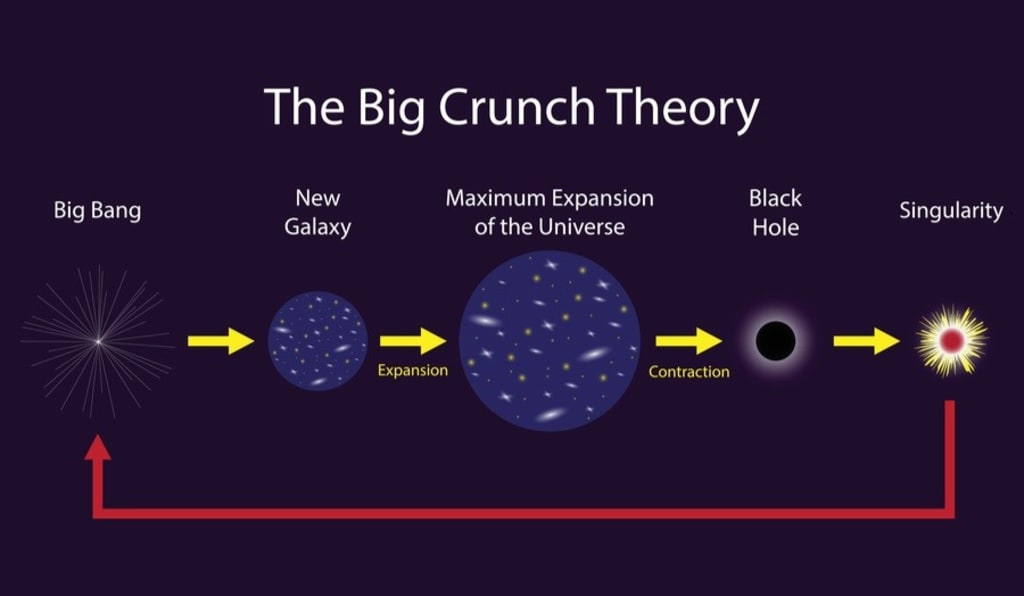HOW WILL OUR UNIVERSE END
THE BIG CRUNCH THEORY

How will our universe end? Big Crunch Theory
Of course, I'm referring to the Big Bang, which is what truly started everything again. Most people have heard of it, but what about the Big Crunch? I'm not talking about some weird candy bar here. We've all heard of the Big Bang, and I'm extremely sorry that the series has finished. There is still debate among scientists on how the universe will ultimately end, despite the fact that most of them believe it was created by a tremendous burst of energy. . There are many theories, like the big fries and the big rip, but the big crunch is thought to be the most likely scenario. So what is the Big Crunch? The Big Crunch Theory has its foundations in general relativity theory by Einstein Everything in life is ebb and flow; if the universe expands due to the Big Bang, then eventually the opposite will become true. Once the universe reaches its largest size, depending on the amount of energy present, it will start to collapse in on itself and eventually form a massive black hole that contains all matter because of the conditions that are present in the singularity of the size. Everything will be squashed down to a tiny size, which is why it is called the Big Crunch. This is probably not great news for all those of you who are a class apart and have a tendency to live billions of years. The good news is that although the Big Crunch is likely, there is a dilemma for people who devote their careers to answering questions like these. We still don't fully understand everything in the universe, and there are still certain unanswered questions that could determine our final destiny. First, it seems that two causes are interacting to cause the universe to expand. density and external momentum The more density there is in the universe, the more gravitational forces there are, since density and gravity are directly correlated. This alone would imply that everything will ultimately converge on everything. The problem with this, however, is that observations of the universe have shown that things aren't behaving as simply as we would expect. The outer reaches appear to be expanding at a faster rate than those closer to us, and galaxies are actually moving farther apart from one another. Scientists don't know why this is happening, but they have given this extra element in the expansion of the universe a name: dark energy. Even though there is no friction in space, the Big Crunch is still unavoidable since all matter would essentially return to its original location due to gravity's strong pull against the Big Bang's initial outward motion. However, there are two possible outcomes: either everything will expand indefinitely or objects will be so far apart from one another that everything will freeze and we will still face a big crunch. The amount of dark energy present will determine whether or not everything expands; if there is enough, which some scientists believe may be the case, then everything will continue to expand; if not, then gravity will eventually overcome the effect and bring everything back together. In a 2015 article, it was stated that the current accelerated rates of expansion are the last gasp of the expanding universe, contrary to some who believe the seeming prevalence of dark energy could easily indicate the beginning of the Big Crunch, which is the final gasp of the expanding universe, and that the contraction will start in tens of billions of years. In that case, how would the Big Crunch occur? Assuming that there isn't enough dark energy and that the Big Crunch occurs, it won't be as spectacular as the Big Bang was. The universe will begin to contract evenly because matter is more or less distributed consistently; this would be a slow process that would eventually pick up speed as galaxies get closer to one another and the effects of gravity become more pronounced in roughly 100 billion years. At that point, things would reach a climax temperature, which would cause star explosions, vaporizations, and the disintegration of all objects into their constituent atoms, which would then start to disintegrate in the final stages as all matter from the universe compacted into a small space. This will cause extreme chaos, according to some predictions, to the point where space-time becomes so warped that it breaks into droplets, rendering all concepts of time, distance, and direction meaningless. Of course, no living thing could have survived this far; we would all have been doomed long before this, so given our incomplete understanding of the processes occurring in the universe, it is impossible to predict with certainty how everything will end. One of the scenarios is the Big Crunch, in which all matter returns to its original location, leaving just an enormous black hole. What happens at that moment is totally up in the air, but it's possible that a new universe could be born. It's also possible that all of this has already occurred multiple times and that the period we are living in is only the latest in a long series of cyclical expansions and contractions. In this case, only those of you who hope to live for billions of years will truly need to be concerned.






Comments (1)
Hey there, just wanna let you know that this needs to have the disclaimer added to the beginning or ending, stating that it was created with the help of AI 😊